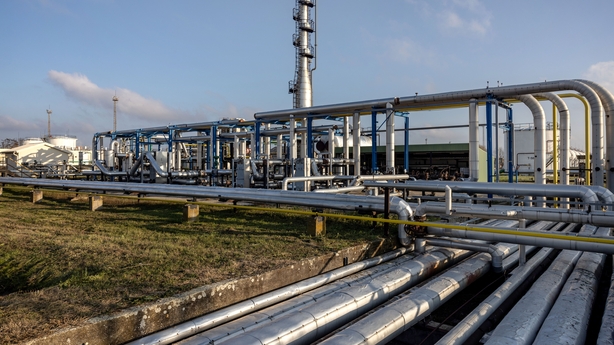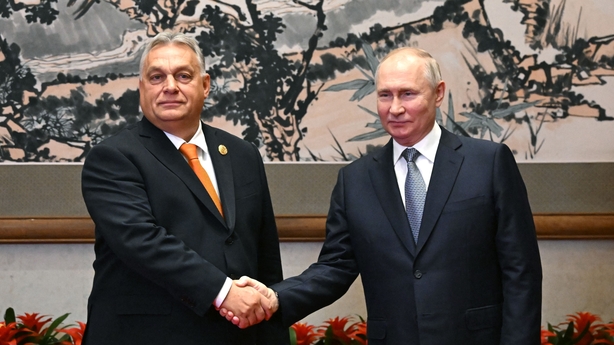French President Emmanuel Macron must be concerned that Hungary is about to derail an important vote on Ukraine's EU ambitions at the EU Council.
On Thursday evening, he hosted Hungary's Prime Minister Viktor Orban for a 'working dinner' at the Elysée Palace in Paris in a bid to sway the Hungarian government's obstructive position towards Ukraine joining the bloc.
Mr Orban's government opposes a European Commission recommendation from November, which asked EU leaders to consider starting formal accession talks with Ukraine next year.
That decision is due to take place on Thursday and Friday at the council summit.
Speaking on Hungarian public radio last week, Mr Orban said: "Ukraine's EU membership, starting with the accession negotiations, does not coincide with Hungary's national interests today."
Mr Orban has been Hungary's prime minister since 2010 and his populist-nationalist Fidesz party governs with a two-thirds majority in the Hungarian parliament.
Since 2015, his government has become an opponent of mainstream EU policy on issues, ranging from migration to LGBTQ rights, the rule-of-law and, more recently, Ukraine.
He has also said that Hungary is opposed to deciding upon a new €50bn economic aid package for Ukraine at the summit.
In a letter earlier this week, Mr Orban urged European Council President Charles Michel to avoid making decisions on starting formal talks, and the latest aid package.
He cited an "obvious lack of consensus", which, he said, would "inevitably lead to failure".
Hungary's prime minister has not ruled out supporting Ukrainian membership in the long run.
Instead, he has called for a five to ten-year strategic partnership agreement to be signed between the EU and Ukraine, to bring Kyiv closer to membership.
Budapest’s stance on starting accession talks with Kyiv is being used as "leverage to gain access to frozen EU funds", Veronika Jozwiak, an Warsaw-based analyst on Hungarian domestic and foreign policy, told RTÉ News.
In December 2022, Mr Orban used Hungary’s veto to this effect, blocking an €18bn aid package for Ukraine in exchange for the European Commission to release some of the €7.5bn in frozen EU cohesion funds at the time.

On Tuesday, two days before the summit, the European Commission is tipped to unlock €10bn of frozen EU funds for Hungary, a nod to progress made by Budapest to address concerns that the commission held about the independence of the Hungarian judiciary.
But that might still not be enough to dissuade Mr Orban from using his country’s veto on both Ukraine's membership bid and the latest aid package.
Mr Orban's government has maintained close economic and diplomatic ties with Russia since its invasion of Ukraine last year.
Hungary is still importing 80% of its natural gas needs from Russia, transported via pipelines in Bulgaria and Serbia.
In contrast, other central and eastern European countries, such as Poland and the Baltic states, have weaned themselves off Russian gas imports.
Hungary’s foreign minister Peter Szijjarto has visited Russia on more than five occasions for bilateral talks over energy deals since the start of the invasion.
Russia’s atomic agency, Rosatom, is also contracted to build Hungary’s only nuclear power plant, a deal that predates Moscow’s invasion of Ukraine.
Mr Orban appears to care little of what other EU leaders think of his continued lines of contact with Russian President Vladimir Putin, who is currently indicted by the International Criminal Court for alleged responsibility in the unlawful deportation of children from Ukraine to Russia.
In late October, Mr Orban met Mr Putin for talks at an economic conference in Beijing, posing for photographs with the Russian leader, a picture that riled many Western leaders and officials.

Gabor Gyori, a Budapest-based political analyst, told RTÉ News, that Mr Orban wants to bring Hungarian foreign policy more in line with, what he sees as, "the rising East as opposed to the declining West".
That policy includes fostering ever-closer economic ties with China, which has stood by Russia since the invasion.
Starting formal accession talks with Ukraine would not prevent Budapest from developing closer ties with Beijing, but it is a policy that is not in the Kremlin's interest.
A dispute between Budapest and Kyiv over the language rights of 150,000 Hungarian speakers in western Ukraine has also contributed to Hungary's lukewarm view of Ukraine's EU membership bid.
The Ukrainian government introduced new laws in 2017 and 2019, which restricted the teaching of minority languages in secondary schools.
Though intended to strengthen the position of Ukrainian over Russian, the language laws led to the closure of more than 90 Hungarian language schools.
Ukraine's parliament adopted a law last December to safeguard the rights of national minorities, but according to the European Commission, it did not go far enough to protect minority language speakers.
Mr Orban and his senior cabinet ministers have championed the cause of Hungarian speakers in Ukraine, and it is a policy that enjoys wide support amongst Hungarian voters.
The dispute between Budapest and Kyiv over language laws may have "played out differently in other circumstances", said Mr Gyori.
The commission's report last month, which assessed Ukraine's progress in order to start formal talks, found that Ukraine had met 90% of the recommendations required. But it recommended that legislation on safeguarding the rights of minorities needed to be improved.
Kyiv scored well on legal reforms, combating money laundering and safeguarding media independence. Tackling corruption is an area that still requires improvement.
Hungary supports EU enlargement for Western Balkans countries, particularly in the case of Serbia. Yet, commencing accession talks with Ukraine is a step that the Fidesz government wants to delay for a decade at most.
It is not clear yet whether Mr Macron managed to reach a compromise with Mr Orban during their meeting on Thursday evening.
But in an interview with French news magazine Le Point, the Hungarian prime minister said that Ukraine "is known as one of the most corrupt countries in the world".
He also said that the EU was not prepared to accommodate Ukraine's large agricultural sector.
By using Hungary's veto at the EU Council meeting, Mr Orban could delay a decision on starting talks with Kyiv until next March, the date of the next council summit.







